
Saraswati (also Sarasvati) is the Hindu goddess of learning, wisdom, music, and aesthetics. She is also known as Bharati (eloquence), Shatarupa (existence), Vedamata ('mother of the Vedas'), Brahmi, Sarada, Vagisvari, and Putkari. As Vac, she is the goddess of speech. Saraswati first appears in the Rigveda and, in later religious texts, she is identified as the inventor of Sanskrit and, appropriately, gives Ganesha the gifts of pen and inks. She is also a patron of the arts and sciences, and the wife of Brahma, even if the Bengal Vaisnavas considered her first the wife of Vishnu. Sarasvati is also worshipped as the goddess of learning in Jainism and by some Buddhist sects.
Worship & Rituals
Saraswati's name means 'elegant', 'flowing', and 'watery' and this is indicative of her status as one of the early Aryan boundary rivers. The Saraswati River (modern name: Sarsuti), just like the Ganges River, flows from the Himalaya and is considered a sacred source of purification, fertility, and good fortune for those who bathe in her waters. The sacred river, again like the Ganges, then developed into a personified deity.
The goddess has her own festivals, notably the Saraswati Puja, held on the first day of spring. During the festival, worshippers wear yellow, which is associated with wisdom and prosperity. Statues of the goddess are also draped in yellow silk, and believers pray for blessings on their pens, books, and musical instruments. Children are taught to write for the first time during the festival, Brahmin priests are given fine food, and ancestors are venerated. Saraswati is also worshipped along with other major goddesses in the pan-Indian celebration of Navaratri. As the patron of music, she is frequently prayed to by musicians before concerts and, as a goddess of intellectual pursuits, by students before examinations.
Saraswati & Brahma
In Hindu mythology, Saraswati is the wife of the great god Brahma. However, according to some traditions, she was first the wife of Vishnu. The latter, though, already had his hands full with two other wives and so he gave Saraswati to Brahma. Although one of the most important Hindu gods, Brahma is rarely actively worshipped. In mythology, this is explained as a result of a curse from Saraswati. The curse was actually brought about through a misunderstanding. One day, when, awaiting his wife to begin an important religious ceremony and so unable to start the ritual punctually, Brahma asked the gods' advice. They responded by creating a new wife for him, Gayatri, so that the ceremony could go ahead at the precise time. However, when Saraswati eventually turned up she was not best pleased to see her husband with another woman and so cursed Brahma never to be worshipped by humanity (even if he is worshipped today in parts of South-east Asia).
Some Hindus believe all creatures were born from the union of Brahma and Sarasvati starting with Manu, the first man. More specifically, Saraswati's son is the rishi (sage) Sarasvata. He, nourished by the bountiful waters of his mother, was able to withstand the Great Drought of Hindu mythology and so survive as the definitive repository of the Vedas sacred texts.
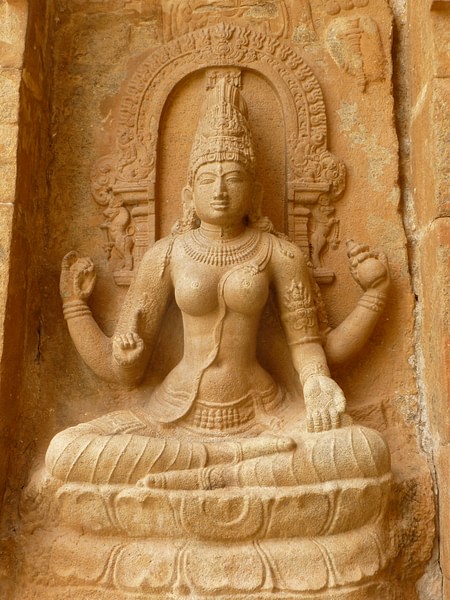
Saraswati in Art
In Hindu art, Saraswati is usually depicted as a graceful youth with white skin. She most often wears a white sari (which symbolises purity) which has a blue border. Not being concerned with worldly goods she rarely wears jewellery. She may have a crescent on her forehead and be seated on a lotus flower. Alternatively, she may be shown riding her vehicle (vahana), either a swan or goose.
Frequently represented in figure sculpture on temples, the goddess may be accompanied by either her husband or a peacock, her traditional assistant. As with many Hindu deities, Saraswati is often depicted with four arms, each holding a symbolic object. In the left hands she can carry a palm-leaf manuscript and ritual water vessel. In the upper right hand she holds a white lotus flower while the lower right hand typically performs the varada mudra, the traditional gift-giving gesture of Hinduism. Another object commonly seen in Saraswati's hands is the vina (the Hindu classical music instrument) which reminds of her gift of music to humanity.
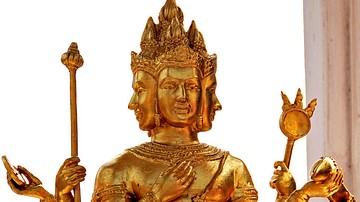

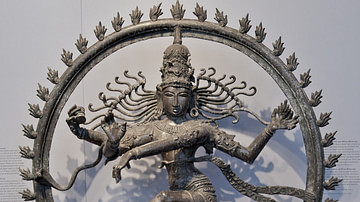
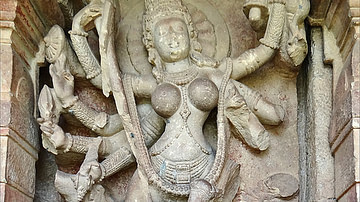
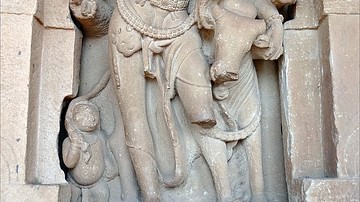
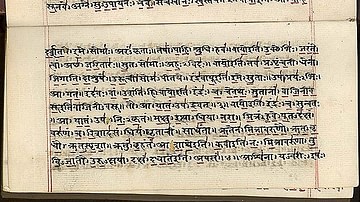

![Saraswati (840) (Amar Chitra Katha) [Paperback] [Jan 01, 2000] Reena I Puri](https://m.media-amazon.com/images/I/51tEKw5xsPL._SL160_.jpg)


